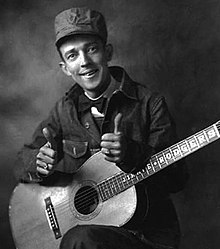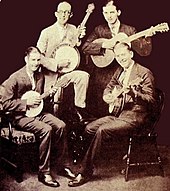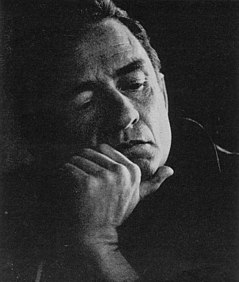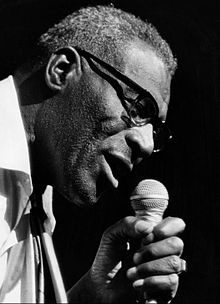
I’m goin’ where the water drinks like cherry wine, sing ’em boy sing ’em
Lord I’m goin’ where the water drinks like cherry wine
Jazz, Blues, Country, Rock – these are just some of the genres of music whose roots are distinctly American. When you have a yodeling railroad brakeman who was a major influence in 3 out of those 4 genres, now that’s something! Let me introduce you to Jimmie Rodgers.
Jimmie Rodgers was born on September 8, 1897 in Meridian, Mississippi. His mother died when he was very young and, after living with relatives for a few years, he returned home to Meridian to live with his father, who had recently remarried. Rodgers’ father worked for the railroad, and he got Jimmie a job as a water boy when Jimmie was 13 years old.
At an early age Jimmie had an interest in being on the road and performing. More than once he left home to perform on the road, only to be tracked down by his father and dragged back home. Jimmie eventually got a job as a brakeman on the New Orleans and Northeastern railroad, a job that allowed him to be taught picking and strumming techniques by numerous rail workers that influenced his guitar playing. During his time working for the railroad he also was exposed to African American work chants, which would have a huge influence on his later music. In 1924 at the age of 27 Jimmie contracted tuberculosis. This temporarily ended his railroad career but it gave him the chance to pursue his primary love of music and performing. He organized a traveling roadshow and performed throughout the southeast until 1927 when a storm destroyed his tent, forcing him off the road. He settled back in Meridian until later that year when he went to Ashville, North Carolina and became a regular performer on a local radio station. Jimmie recruited some local musicians called the Tenneva Ramblers and together they performed as the Jimmie Rodgers Entertainers. They secured a weekly spot on a local radio station. Local newspapers at the time described his music as “ Jimmy [sic] Rodgers and his entertainers managed … with a type of music quite different than the station’s usual material, but a kind that finds a cordial reception from a large audience.” Another columnist remarked that “Whoever that fellow is, he either is a winner or he is going to be.” The type of music that the Jimmie Rodgers Entertainers were playing would become the cornerstone of both country and blues music

Later in 1927 the band heard that Ralph Peer of the Victor Talking Machine Company was coming to Bristol, Tennessee to record local area musicians. They auditioned for Ralph Peer, and were invited back the next day to record. That evening disagreements arose within the band as to how and who should be featured on the record label, so Jimmie said he would just go and do it himself. He recorded two songs and was paid $100. These songs would later be recognized as some of the first country songs ever recorded, long before country music was even a thing.
The recording achieved moderate success, so Jimmie went to New York in November of 1927 to record again for Ralph Peer. He recorded four more songs, including ‘Blue Yodel No. 1’. The song would become better known as ‘T for Texas’, and it featured Jimmie’s trademark yodel, which he claims to have learned from a group of Swiss emissaries doing a demonstration at a church. The song would go on to sell half a million copies, propelling Jimmie Rodgers to stardom.
Over the next few years Jimmie stayed busy, performing at shows around the country. He even did a movie short for Columbia Pictures titled ‘The Singing Brakeman’. Then in 1930 he recorded what would become his best known song, ‘Blue Yodel No, 9’. The song featured Louis Armstrong on trumpet and Armstrong’s wife Lil on piano.
By 1932 tuberculosis had forced Rodgers to give up touring. He had settled in San Antonio, Texas where T for Texas (Blue Yodel No. 1) had been a big hit. He hosted a weekly radio show where he was still able to do what he loved, and that was play music. However, Jimmie was never one to stay in one place too long, so in May of 1933 he traveled to New York again to record some new music. Ravaged by the disease that had captured him in 1924, he managed to record 4 songs the first day before he went back to his hotel, exhausted. After a day’s rest he returned and recorded a few more songs, this time accompanied by musicians. Notably, he recorded ‘Mississippi Delta Blues’ as well as a final song done solo titled ‘Years Ago’. He was so tired that a cot was brought into the studio for him to rest on in between songs. Two days after this session Jimmie Rodgers died in a New York City hotel room. His body was placed in a pearl gray coffin and transported back to Meridian, Mississippi. He is buried in Oak Grove cemetery in Meridian.
At the time of his death, Jimmie Rodgers was 35 years old. He had only released recorded music from 1927 – 1933, yet he accounted for 10% of all of RCA Victor’s sales. Truly remarkable when much of his career was during the depression. His lasting impact on music is even more impressive. Let’s take a look at that impact on country, rock, and blues music.
Country
Known as the Father of Country Music, Jimmie Rodgers took mountain music such as what was being done by the Carter Family and turned it into popular music that today is known as country music. When the Country Music Hall of Fame was formed in 1961, he was one of the first three inductees (along with Fred Rose and Hank Williams).
Artists that Jimmie Rodgers influenced include:
- Merle Haggard
- Gene Autry
- Hank Snow
- Lefty Frizzell
- Ernest Tubb
- Willie Nelson
- Dwight Yoakam
- Johnny Cash – who said that the first record he ever heard was a Jimmie Rodgers recording

Rock
In 1986 Rodgers was inducted as part of the inaugural class into the Rock and Roll Hall of Fame as an early influence. He was also inducted into the Songwriters Hall of Fame in 1970. When listening to his songs it might be hard to make the connection to rock and roll, but often times performers inspire others to pursue their dreams and make their art, in whatever form.
Rock artists that Jimmie Rodgers influenced include:
- Bob Dylan – who remarked “The songs were different than the norm. They had more of an individual nature and an elevated conscience… I was drawn to their power.”
- Bono
- Jerry Garcia
- Dicky Betts
- Elvis Presley
- Jerry Lee Lewis
- Lynyrd Skynyrd – who included a cover of Rodgers’ ‘T for Texas (Blue Yodel No.1) on their 1977 live album ‘One More From The Road’
Blues
Jimmie Rodgers is also cited as a major influence on blues music in America. Drawing on the work chants he heard as a youngster working on the railroad, he is credited with recording some of the earliest blues records. Jimmie often recorded with African American musicians, and his influence on blues artists from his home state of Mississippi is noteworthy.
A young blues artist by the name of Chester Arthur Burnett idolized Jimmie Rodgers. He tried to emulate Rodgers trademark yodeling but instead it sounded more like a howl. Years later, after changing his name, blues giant Howlin’ Wolf was quoted as saying “I couldn’t do no yodelin’, so I turned to howlin’ and it’s done me just fine”.

Jimmie Rodgers is also inducted in the Blues Hall of Fame, and on May 3, 2007 he was honored with a marker on the Mississippi Blues Trail in his home town of Meridian.
Blues artists that Jimmie Rodgers influenced include:
- Howlin’ Wolf
- Muddy Waters
- Big Bill Broonzy
- Mississippi John Hurt
- Tommie Johnson
- The Mississippi Sheiks
In the end, to list every country, rock, and blues musician influenced by Jimmie Rodgers would turn the Musical Tree into a Musical Forest! It’s hard to find any one artist who had such an impact over so many different artists and musical genres. What is even more remarkable is that his performing career was so short yet his popularity, during the depression no less, left a mark that few other musicians can match. During his brief but remarkable career, Jimmie Rodgers did manage to find the water that drank like cherry wine. And for that we are all grateful.



Wow! Truly amazing. Good ol’ blues. Thanks for sharing!
What a great story, thank you for sharing that.
Pingback: Tommy Johnson – Teke's Musings
Pingback: Cannon’s Jug Stompers – Teke's Musings